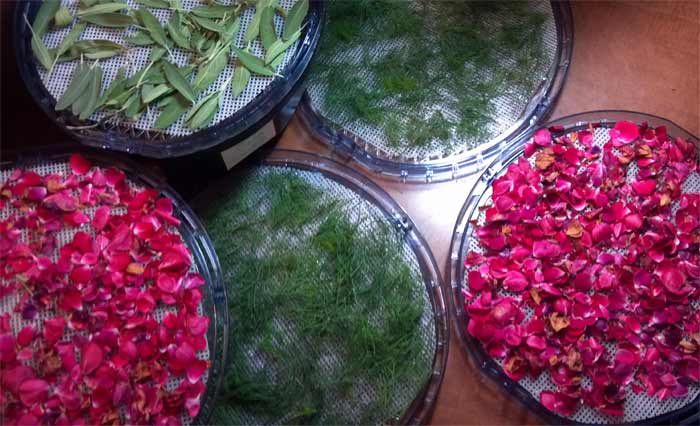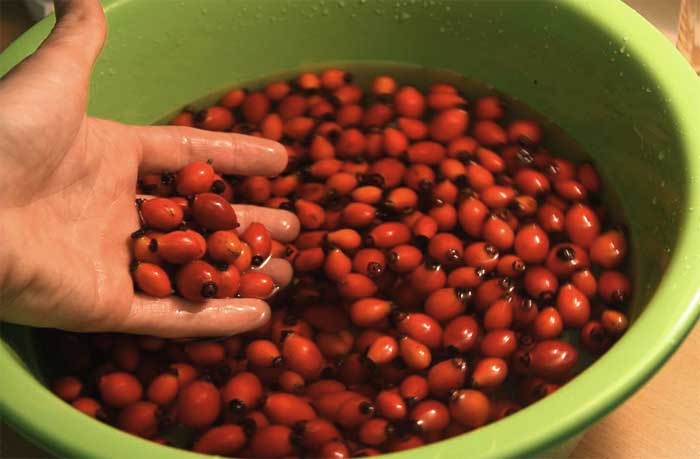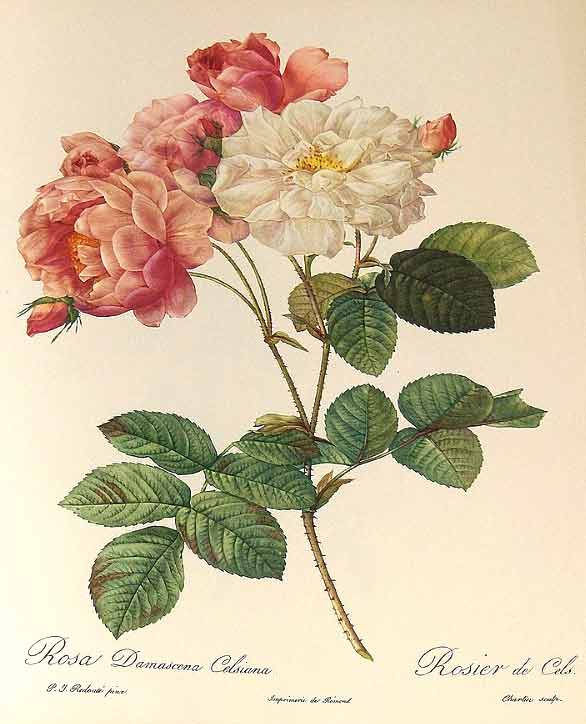Rose in herbal medicine

What are roses used for?
Roses (Rosa Centifolia and Rosa Damascena) are used in herbal medicine and aromatherapy to treat skin problems, depression, stress, anxiety, and more.
Rose petals are made into lotions, rose water, herbal tea, ointments, and essential oil.
Rose seed pods, known as rose hips, are a useful food source due to their high concentration of vitamin C.
Roses are especially good for the female system.
Rose essential oil, distilled from rose flower petals, is deep, rich, and floral with a sensual uplifting scent. Although expensive, many aromatherapists and herbalists consider it worth the money (approximately $500 per fluid ounce).
Rose oil is considered an aphrodisiac with mild sedative and anti-depressant properties. It is great for the skin, improving the look of fine lines and wrinkles.
Take time to smell the roses. The scent of rose promotes feelings of well-being and helps heal depression.

Roses are very useful in herbal medicine.
Treat stress with rose petal tea. It relaxes the mind and the body.
Rose petals are made into herbal tea for the treatment of depression, sinus congestion, colds, digestive ailments, nausea, vomiting, constipation, sore throats, coughs, swollen eyes, puffiness, broken capillaries, insomnia, PMS, menopausal symptoms, reduced libido, and eating disorders.
Rose petal tea can be taken as a drink, used as a gargle, or applied as a wash.
Rose essential oil and aromatherapy
Rose essential oil one of the most useful oils in aromatherapy. It is diluted and used externally to help regenerate skin, to promote feelings of well-being, and to purify the system.
The scent of rose oil is very soothing for the nervous system. It is a gentle sedative and can help stop panic attacks.
When combined with Melissa essential oil, the blend is known to help herpes sores and other skin eruptions disappear.
Rose and herpes
For treating herpes outbreaks, mix 5 drops of rose oil with 10 drops of Melissa essential oil and apply straight (undiluted) to the sores. Small amounts of this blend may also be used on boils, carbuncles, the groin area, and lymph nodes.
Combine rose with lavender essential oil for detoxing.
Rose essential oil is also combined with lavender essential oil and a carrier such as almond oil to rub into the lymph nodes for detoxification and revitalization.
Rose oil contains over 300 chemicals, of which only 100 have been identified and studied.
For centuries, herbalists have realized the value of rose. Who knows what scientists may one day discover about this magnificent flower!
The scent of roses is soft and sensual.
Rose essential oil is known as the Queen of Essential Oils.
It is very expensive since it takes 30 roses to make one drop of oil.
Rose oil is an aphrodisiac and is considered a good remedy for disorders of the ovaries and female reproductive organs.
Wild roses are usually used in herbal medicine. Roses that are grown for size, instead of scent, are not used for healing purposes.
If you want to learn more, The American Rose Society has lots of good information about the fragrance of roses.
More about roses
Aromatherapist and author Kathi Keville shares the uses and herbal history of the rose in the following video:
Use rose essential oil on mature skin.
Rose essential oil is often included in cosmetic creams for its refreshing and tonic effect on sensitive skin. The oil is very appropriate for mature, aging skin as it moisturizes, helps diminish the appearance of fine lines, and gives skin a youthful glow.
Dilute rose essential oil and use as a compress on tired eyes.
Rose essential oil, diluted in distilled water, may be used as a compress to treat tired or inflamed eyes.
Rose oil is anti-bacterial, astringent, antiseptic, anti-inflammatory, and a good anti-depressant. If you don't know what these terms mean, please visit my glossary of herbal properties.
If you don't have the oil, rose petal tea may also be used as an eye compress.
The scent of roses is considered to be an aid to meditation.
Rose helps balance hormones and calms anxiety that may cause frigidity or impotence.
When used in a gentle massage, rose essential oil can help heal broken capillaries and stimulate circulation.
Always dilute essential oils before applying to skin.
Rose water is less expensive and may be used as a substitute for the oil. I like to spray rose water on my face in the hot summer. It is so refreshing!

The science of roses and healing
Studies show that rose petals have strong biological anti-inflammatory and antioxidant properties.
Rose petal extract is shown to contain very useful polyphenols, terpenes, flavonoids, and anthocyanins. These substances can help heal everything from skin problems to hemorrhoids. They also protect against sun damage.
Damask roses are especially potent.
Tests show that they are antibacterial, antioxidant, antitussive, hypnotic, and anti-diabetic.
In Iran, there is a strong bond to Damask roses. Due to holy status, people call this plant Flower of Prophet Mohammed.
Damask roses are grown for their aroma, for making rose water, and for essential oil. Pure Damask rose oil is one of the most expensive oils in the world.
Damask roses are ancient plants. Rose fossils have been found showing that the plants were around over 30 million years ago.
Damask roses originated in the Middle East but are now cultivated around the globe.
Roses are traditionally used in the treatment of abdominal pain, chest pain, excessive menstrual bleeding, and digestive problems. They are also used for inflammation, especially the neck.
North American Indians used rose as a cough remedy.
It is also used as a laxative, for allergies, to reduce headache pain, and to heal skin problems.
Rose essential oil is used when treating depression, grief, nervous conditions, stress, tension, and anxiety.
Rose water, a mix of water with at least 10% rose oil, is used in religious ceremonies to calm people and for washing.
Rose essential oil is prepared under careful scientific controls. Real oil is pale, yellow, and semisolid at room temperature.
Some Iranians eat dried rose petals with yogurt. It is very good for digestive issues.
Studies show that roses have a hypnotic effect on the central nervous system. Roses bring about relaxation and pain relief.
Rose essential oil is used in many fine perfumes.
The scent of rose is rich and deep with flowery undertones. Many perfumes would not exist if not for the aroma of rose.
Stopping to smell the aroma of a rose can actually help cure grief, resentment, and anger.
Rose hips are full of vitamin C.
Rose hips are actually seed pods and are sometimes used as a kidney tonic. One cup of prepared rose hips equals the vitamin C content of 144 oranges.
Harvest rose hips in the fall for making nourishing teas, syrups, and fruit drinks.
Preparing rose hips for use as a herbal remedy.
To prepare rose hips, cut off stem and blossom ends, slit down one side with a knife, and remove seeds. Use the white pulp for medicinal purposes and for vitamin C content.

Rose petals are safe to eat.
Roses come in countless varieties. All are edible but the wild varieties are preferred for use in herbal medicine. Never eat or use roses in healing if they have been sprayed with pesticides!
Both cultivated and wild roses are used in cooking to make jellies, jams, and garnishes.
Use rose essential oil for beautiful skin.
Rose essential oil is great for the skin and is an excellent moisturizer. Use on dry, aging, irritated, inflamed, and sensitive skin for superior results when nothing else works.
Use with witch-hazel for a cooling and healing acne lotion.
Rose essential oil supports the regeneration of new skin cells and is a wonderful addition to facial creams, bath oils, and massage blends.
Dilute rose essential oil when using on skin.
Rose oil brings a refreshing feeling to sensitive skin. unlike other oils that can cause irritation on sensitive skin, rose is gentle and safe.
Beware of cheap rose oil substitutes.
Rose essential oil is sometimes included in fine cosmetics, but be aware of cheap substitutes. Synthetic rose oil is in everything from perfume to hand lotion.
In the case of rose essential oil, it's best to splurge for the real thing, or use rose water. Rose water is a by-product of real rose essential oil and is very safe and useful. As with rose essential oil, rose water's aroma is delightful.
Rose essential oil is good for the heart and blood vessels.
Rose oil is used in aromatherapy and massage It is useful as a heart tonic, a kidney tonic, a nerve tonic, and a woman's tonic.
Use rose essential oil for women's problems.
If they can afford to, women should use rose essential oil when treating PMS, menstrual irregularity, vaginal infections, and uterine problems. It really can help.
Rose essential oil is useful as a herbal remedy.
Rose essential oil soothes the anxiety that causes frigidity and impotence.
Rose oil clears congestion, strengthens the digestive tract, clears the sinuses, cleanses the urinary system, relieves constipation, stops vomiting, and stops nausea. It can even heal sore throats while easing coughing spasms.

More uses for rose essential oil
In aromatherapy, rose essential oil is used to treat grief, jealously, resentment, anger, depression, insomnia, anorexia nervosa, panic attacks, and low self esteem.
It helps bring about a positive attitude. Rose essential oil is also an aid to meditation and contemplation.
Rose oil is said to have the power to unite physical and spiritual love. It has a base to middle note and is a fine addition to perfume.
*Avoid rose essential oil in the first four months of pregnancy. If using rose oil near the eyes, make sure to dilute it with plenty of cold-pressed oil.
Do not take essential oils internally without consulting a qualified professional. Always consult with a healthcare professional before using any herbal remedy especially if pregnant, nursing, or taking other medicines.
Sources:
https://www.ncbi.nlm.nih.gov/pmc/articles/PMC6261181/
https://www.ncbi.nlm.nih.gov/pmc/articles/PMC3586833/
Blessings to you and yours!
Thanks so much for reading my blog. Jan.

*Note - the information on this website has not been evaluated by the Food and Drug Administration.
© 2005-2024 website design and content by Janice Boling